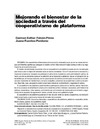Please use this identifier to cite or link to this item:
https://accedacris.ulpgc.es/jspui/handle/10553/56358
| Title: | Mejorando el bienestar de la sociedad a través del cooperativismo de plataforma | Other Titles: | Improving social well-being through platform cooperativism | Authors: | Falcón Pérez, Carmen Esther Fuentes Perdomo, Juana |
UNESCO Clasification: | 53 Ciencias económicas | Keywords: | Economía colaborativa Cooperativismo de plataforma Plataforma cooperativa Rehabilitación urbana Usuarios de la plataforma digital, et al |
Issue Date: | 2019 | Journal: | Ciriec-Espana Revista De Economia Publica Social Y Cooperativa | Abstract: | Una característica diferenciadora de la economía colaborativa es el uso de las nuevas tecnologías por diferentes agentes que persiguen un objetivo común. Esta revolución digital plantea un reto a las organizaciones de la economía social.El objetivo de este trabajo es analizar cómo el cooperativismo de plataforma puede ser una vía adecuada para llevar a cabo la mejora del bienestar social en barrios vulnerables. Con el fin de promover la renovación y mejora de los barrios es necesario una participación activa de los ciudadanos y de la administración pública; de hecho, uno de los elementos claves en la obtención de la mejora de la calidad de vida es la implicación de los residentes que, en muchas ocasiones, son los que proponen los cambios y la renovación en sus barrios con deficiencias importantes de habitabilidad y consumo energético, problemas de accesibilidad y carencia de servicios. Hace falta, pues, recuperar la ciudad consolidada a través de la rehabilitación y regeneración urbana. El cooperativismo de plataforma puede facilitar la participación pública de los distintos actores intervinientes en los procesos de rehabilitación urbana como residentes (a título individual o asociados), administraciones públicas, cooperativas y otros usuarios, promoviendo que se involucren de manera activa en el diseño y seguimiento de los proyectos de regeneración urbana, a través del uso de la plataforma digital.El cooperativismo de plataforma puede ser el nexo de unión entre los valores cooperativos y la revolución digital encaminados a promover la mejora del bienestar de la sociedad. Currently, collaborative economy is an emerging concept which is open to debate, including different meanings depending on the model to provide services, the kind of participant or the use of shared information and communication platforms. However, a distinguishing feature of the collaborative economy is the use of new technologies by the various agents concerned in order to get a common goal such as in the financial sector or in the education sector. This new approach can be transferred to already consolidated organizations, which are noted for pursuing a social interest against the interest of the capital. These organizations seek social benefit and not the economic benefit, seeking a positive social impact that can change society. It is precisely the digital component and the use of the technologies of information the aspect that distinguishes these emerging activities that are developing in recent years. Besides, they are changing purchasing behaviour and ways of doing business. These changes are having significant impacts in economic and employment terms, conflicts with traditional companies that are disadvantaged, or breaches of tax duties. But, at the same time, it also encourages many actions of collective interest, to the extent that digital platforms can be an effective tool to track achievement of the multitude of actions in favour of the community. The aim of this paper is to analyse how platform cooperativism could be a suitable way to carry out the improvement of social welfare in vulnerable districts. In order to enhance the renovation and improvement of neighbourhoods it is necessary an active participation by citizens and public administrations. In fact, a key element to obtain an increase of the quality of life is the implication of residents, who often propose the changes and renovation in their districts, with significant deficiencies of habitability and power consumption, accessibility problems and lack of services. There is a need to recover the consolidated city through urban rehabilitation and urban renovation. |
URI: | https://accedacris.ulpgc.es/handle/10553/56358 | ISSN: | 0213-8093 | DOI: | 10.7203/CIRIEC-E.95.12655 | Source: | CIRIEC-España Revista de Economía Pública, Social y Cooperativa [ISSN 0213-8093], n. 95, p. 161-190 | URL: | http://dialnet.unirioja.es/servlet/articulo?codigo=6887558 |
| Appears in Collections: | Artículos |
SCOPUSTM
Citations
14
checked on Jun 8, 2025
WEB OF SCIENCETM
Citations
10
checked on Feb 8, 2026
Page view(s) 1
416
checked on Jan 11, 2026
Download(s)
227
checked on Jan 11, 2026
Google ScholarTM
Check
Altmetric
Share
Export metadata
Items in accedaCRIS are protected by copyright, with all rights reserved, unless otherwise indicated.
